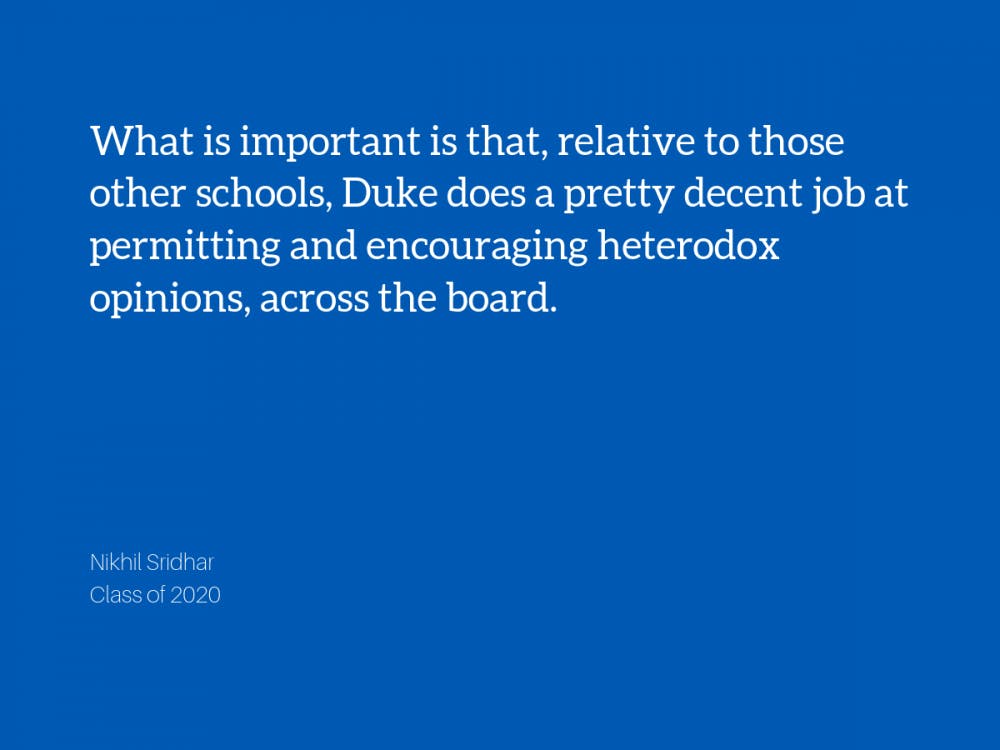It’s not an uncommon experience to hear Duke students who are politically right-of-center to claim that they’re marginalized on campus and that they face discrimination for their set of beliefs. This perception, you will notice, often manifests as excuses for students to hide their viewpoints in academic or social settings. It is my view that, more often than not, these fears are mired in tales of hyperbole and unrealistic expectations. This isn’t to say that Duke is perfect, but rather to encourage intellectual minorities to feel less apprehensive about expressing their views.
Of course, Duke is overwhelmingly left-wing, both in terms of student and faculty, but this is not uncommon at an elite institution. What is important is that, relative to those other schools, Duke does a pretty decent job at permitting and encouraging heterodox opinions, across the board. Anecdotally speaking, I’ve never once hid my commitment to free markets in any of my classes, and it would be difficult to convince me that I have been a victim of discrimination for holding these views. Often, professors have been more than happy to entertain my perspectives (and those of my right-leaning friends) and challenge me to defend them to the best of my abilities.
Furthermore, Duke does an above-average job in preserving those conditions necessary to maintain free and civil discourse among young intellectuals looking to engage in political debate. The Foundation for Individual Rights in Education (FIRE), which provides a rating for schools based on their free speech policies, gave Duke a ‘green light’ for its speech code, which is the highest possible rating that a school can get, which means that FIRE couldn’t find “any serious threats to students’ free speech rights in the policies on that campus.” Other campuses are much less fortunate: FIRE claims that fewer than 30 universities out of around 450 have earned a green light.
I am more than willing to concede that there is not nearly enough ‘intellectual diversity’ at Duke as I would ideally like to see, but that isn’t so much a problem with a ready solution as it is a result of those students that decide to apply to schools like Duke. The real issue is, however, that conservative and libertarian students are simply too afraid to voice their opinions, either because they cannot defend their views, or out of fear of some abstract social consequences.
If you are in the former camp, perhaps you shouldn’t be a conservative or libertarian. I would ask such students to really think about why they believe what they believe, and hopefully consult the rich tradition of thinkers produced by the political right, so they may be able to formulate a more consistent politics founded in reason, rather than fly-by-night beliefs they picked up from that edgy kid they sat next to in AP Government.
If you are in the latter group, I would urge you to reconsider your stance: most students are far more tolerant of dissenting views than you might think. I’ve had some of my most memorable conversations on campus with students with profound opposition to my views on a host of issues, political and otherwise. On the other hand, if your “friends” are genuinely willing to spite you for your lack of intellectual conformism, you might want to consider expanding your friend circle.
A significant part of the college experience is having your ideas challenged and developing them in an environment dedicated to learning. Instead of feeling like ideological outcasts, conservatives and libertarians should rejoice at the opportunity to whet their views and participate in regular and meaningful contests of ideas, to a degree that many of their left-leaning peers will not. The fact that some students don’t experience this facet of university life is more than tragic, and I do hope that right-of-center students can learn to discard their fears, and hopefully stimulate more intellectual discourse as election season rears its head.
Nikhil Sridhar is a Trinity senior. His column "laissez faire et laissez passer" runs on alternate Mondays.
Get The Chronicle straight to your inbox
Signup for our weekly newsletter. Cancel at any time.

